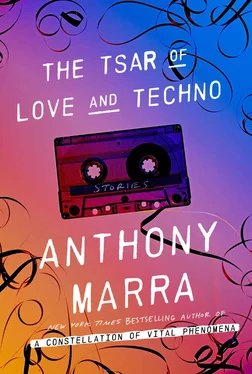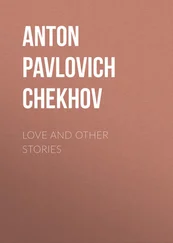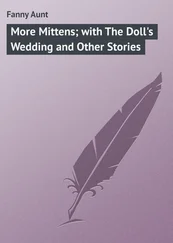“My grandpa fought his way all the way from Stalingrad to Hitler’s bunker and you know what they did to him when he got back? Popped his patriotic ass in a gulag,” Valeriy declared. He picked white grains from his scalp. Lint or dandruff, couldn’t tell. “I’m ashamed to be related to such a sucker.”
“Two hundred got beat to death last year before even making it to Chechnya. And if they’re reporting two hundred, the real figure’s got to be as long as an international phone number. Dedovshchina , no joke.”
“Two years with nothing but your canteen to fuck, that’s no joke.”
“That’s why I’m saying jail time’s soft time.”
“Where’s Tony with those beers?” Our names — Aleksandr Kharlmov, Valeriy Lebedev, Ivan Vladim, and Sergei Markin — fit who we were, not who we wanted to be, so we’d rechristened ourselves: Tony Montana, Joe Pesci, Don Corleone, and Tupac. Our spirit animals were all of the genus American Kingpin Tragically Slain in His Prime. Our parents learned English from the Beatles, but we learned from Biggie.
Different afternoon, different park, same conversation.
“The trick’s to jail just till the insurgency’s over.”
“And how you gonna do that?”
“Easy,” I boasted. Never forget the first three letters of confidence . “You forecast how long the war will last, how long you’ll need to jail, then find a felony that fits the sentence.”
Crime and Punishment. We knew nothing of history — decent odds that three of the four of us couldn’t tell you what year Jesus was born — but we staked our futures by predicting it. We took bets: The war would finish in a year, two, five. Browsing old newspapers and Yandexing court reports, we found sentences to fit each prediction. A year for assaulting an ethnic minority. Two to five for armed robbery. Three to seven for narcotics smuggling.
We wanted to become gangsters, but who could we look up to? Where were our heroes? Our fathers drove gypsy cabs, washed dishes, and pumped gas, their blood so timid a guillotine couldn’t make them bleed. They longed for the old days, not because their lives had been better, but because there had been an equality of misery back then. We were their sons and we wanted more.
Conscription season began in spring. The steady sluice of burgs had dissolved down the Neva. A bask of geriatric crocodiles sunbathed at the beachfront wall of Peter and Paul Fortress. Daytime drunks extended their working hours. The arctic winter unraveled into pastel peach, lavender, plum. We received postcards from the military commissariat the same day and carried them with us to the park. Mine was the first correspondence I’d received since the letters my father had sent from prison.
I compared my red-bannered postcard with my friends’. They were identical but for our names. By law, the commissariat could send us to a military base for testing the day after graduation, but for whatever reason, they’d given us until August. If we all died in Chechnya, would our families receive form postcards, identical but for our names, or would the army honor our sacrifice with a form letter?
“I’ll knock off an electronics store,” Aleksandr announced, killing his cigarette in five colossal puffs. He had the lungs of a blue whale. “Three years, that should cover it.”
“Too long, Tony,” Ivan said. “Any day now Putin’s going to tear off his shirt, jump on a brown bear, ride that bitch bareback to Grozny, and finish those beards by himself. Six months tops. I’ll mug a tourist.”
“Four years,” Valeriy said, still picking the rice-white flakes that had turned out to be lice. “I’m going to steal a police car.”
We exploded into laughter.
“Laugh it up,” Valeriy said, “but you know no policeman’s going to worry himself about a robbed electronics store or tourist. Shit, robbing tourists is their job. Take a policeman’s ride, though. Four years, easy.”
They turned to me. “I haven’t decided how many years,” I said, a beat too slowly. “But don’t worry. I’m in. I’m all in.”
We pounded fists, then swaggered toward Ploshchad Lenina to pick up a thousand-ruble check, so named because the heroin comes folded in receipt paper. Oily rainbows arced the swollen sparkle of the Neva. Tourists clambered from pontoons, all oohs and aahs , jumping for their cameras as though the imperial mansions lining the banks were a flock of rare birds. I didn’t see the rush. Those pink powder puffs weren’t flying anywhere. We turned onto Arsenalnaya, then onto Komsomola. In the distance, brick-walled, spired, and domed, a tourist would be forgiven for mistaking Kresty Prison for a palace. In history class, we learned about the red herrings caught, descaled, and fried up in the 1937 show trials. In literature class, we read an Akhmatova poem about the prison. Her son was detained for seventeen months. With hundreds of other women she waited outside those great brick walls for news of the accusation, verdict, sentence. “Can you describe this?” a woman with blue lips whispered. And Akhmatova answered, “Yes, I can.”
Now, outside the brick walls, their granddaughters waited, a few lost in oversized overcoats, the wives, girlfriends, mothers, and daughters of pretrial prisoners. We catcalled. We hooted. We asked if they wanted to party. Had they stood there seventy years earlier, their sorrows would’ve been worth a great poet’s words. But who reads poetry anymore?
“I’m not scared,” I stated, and Valeriy, Ivan, and Aleksandr all agreed they too were unafraid. I didn’t know if we meant Kresty or Chechnya. Up ahead a Lenin statue toupeed in pigeon shit silently perorated to masses. I gathered the sweat-softened bills from my friends and climbed to the third-floor flat of a crumbling communal housing complex to pick up the thousand-ruble check.
THE job was like nothing found in the classifieds of regional papers and blog forums, where postings sought multilingual men with business degrees and attractive single women to work as dancers in European strip clubs. No glamour, no glitz, no status to propel me past the face control at Jakata or Decadence nightclubs, whose bouncers are harder to bribe than Peter at the Pearly Gates. That first day I dragged my ass out of bed at four in the morning to help Kirill dress. His shirt, trousers, and bedsheets were cut from the same square of bureaucratically blue canvas.
“How the hell do you normally get dressed?” I asked.
He sat at the end of his bed with a ten-thousand-watt smile. He was actually enjoying this! Happiness is zero sum, and the lower my stock in it fell, the higher his rose. Any moment it’d burst right through the ceiling.
“I can do it myself,” he said. His smile revealed teeth the color of cooking oil. “It just takes longer.”
“We’ve got all day.”
“You’re mouthy,” he said, “for a virgin.”
Devil! Who’d told him? And more importantly, had he told anyone else? I’d never live it down. Maybe I could sell my kidneys for the identity of a reindeer herder on the Yamal Peninsula? A place that means “End of the World” in the local tongue just might be far enough. In my mind, I’d already built an igloo and married a muskox when Kirill cut in.
“Look at you, I’ve eaten borscht with less color than your cheeks.” He closed his eyes with the serenity of a man whose desires are modest enough to be met. “I remember when I popped my cork for the first time. It was my thirteenth birthday.”
At eighteen I wasn’t just a virgin. I was an elderly virgin.
“My father took me to his favorite prostitute to celebrate my becoming a man,” Kirill went on. “He stood just beside the bed while I went at it. Not close enough to make it weird, mind you. He just wanted to make sure I did my part. I finished about five seconds after I began and he burst into applause. Never made the old man prouder.
Читать дальше












